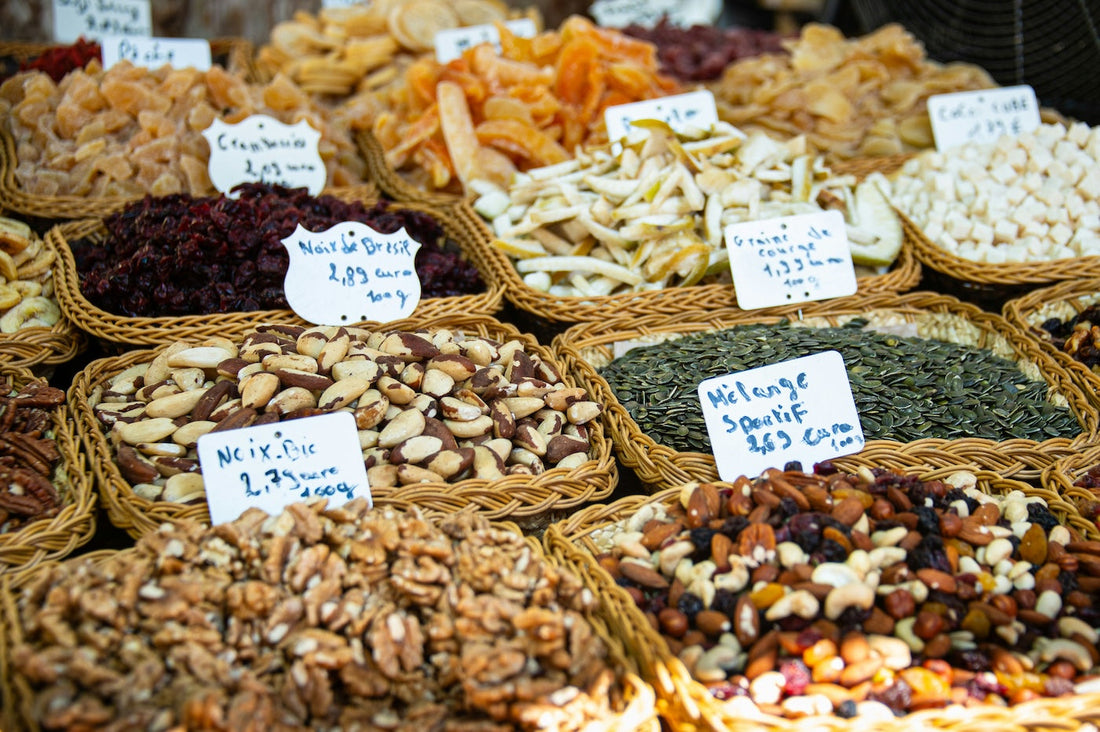
What are Phytonutrients and Phytochemicals? Health Benefits Explained
Share
Phytochemicals, or phytonutrients, are chemical compounds produced by plants, generally to help them resist fungi, bacteria and plant virus infections, and also consumption by insects and other animals. They are part of the plant's immune system and help protect the plant from environmental stressors, and may provide similar effects to our cells. Phytochemicals can be found in all plant-based foods, such as fruits, vegetables, legumes, grains, nuts, seeds, and spices.
🌱 Ready to Boost Your Phytonutrient Intake?
Discover our organic, phytonutrient-rich cleanses designed to flood your body with plant power!
Shop Cleanses NowPhytochemicals are not essential nutrients, meaning that they are not required for the body's basic functions. However, they offer impressive health benefits, such as protecting your cells from damage, preventing cancer, improving immune function, supporting brain and heart health, and more. Phytochemicals have antioxidant and anti-inflammatory properties that can help reduce the risk of chronic diseases and aging-related disorders. They can also modulate the activity of enzymes, hormones, and genes involved in various metabolic pathways.
There are thousands of phytochemicals identified in plants, but only a few have been extensively studied. Some of the most common and well-known phytochemicals are carotenoids, flavonoids, glucosinolates, phenolic acids, resveratrol, and ellagic acid. Each of these phytochemicals has a unique chemical structure and biological function, and they can interact with each other and with other nutrients to produce synergistic effects. Therefore, it is recommended to consume a variety of plant foods to obtain a wide range of phytochemicals and their health benefits.

💡 Want to Learn More About Nutrition?
Explore our comprehensive guides on plant-based nutrition and wellness.
Read More ArticlesSome of the most well-known phytochemicals are:
- Carotenoids: These are pigments that give fruits and vegetables their yellow, orange and red colors. They are found in foods like carrots, pumpkin, tomatoes, bell peppers, apricots and mangoes. They have antioxidant and anti-inflammatory properties, and some of them can be converted into vitamin A in the body. Carotenoids may lower the risk of eye diseases, skin aging, cardiovascular diseases and some cancers.
- Flavonoids: These are a large group of phytochemicals that have various effects on the body. They are found in foods like tea, wine, chocolate, berries, citrus fruits, apples, onions and soybeans. They have antioxidant, anti-inflammatory, antiviral, antibacterial and antiallergic properties. Flavonoids may modulate blood pressure, blood clotting, blood sugar, cholesterol levels and inflammation. They may also protect the brain from oxidative stress and neurodegeneration. [6] [7]
- Phenolic acids: These are another group of phytochemicals that have antioxidant and anti-inflammatory effects. They are found in foods like coffee, tea, spices, nuts, seeds, grains and fruits. Phenolic acids may protect the DNA from damage, modulate gene expression and enzyme activity, and inhibit cancer cell growth.
- Glucosinolates: These are phytochemicals that give cruciferous vegetables their pungent smell and taste. They are found in foods like broccoli, cabbage, cauliflower, kale and Brussels sprouts. They have anticancer properties by inducing detoxification enzymes, inhibiting carcinogen activation and inducing apoptosis (cell death) in cancer cells.
- Resveratrol: This is a phytochemical that is found in the skin of red grapes and other fruits. It has antioxidant and anti-inflammatory properties, and may activate genes that regulate aging and longevity. It may also protect against diabetes, obesity, and neurodegenerative diseases. You can find resveratrol in foods like red wine, grapes, berries, and peanuts
Ellagic acid: A natural antioxidant that is found in many fruits and vegetables, such as berries, grapes, pomegranates, and walnuts. It has been studied for its potential health benefits, such as reducing inflammation, preventing cancer, and improving brain function. Ellagic acid works by neutralizing harmful free radicals, regulating immune function, and inhibiting the growth of tumor cells. It may also help lighten your skin by blocking the production of melanin, a type of skin pigment. Some of the richest sources of ellagic acid are blackberries, raspberries, strawberries, and pomegranates.
🥤 Get These Phytochemicals in Every Sip!
Our cold-pressed juices and botanical beverages are packed with the phytochemicals mentioned above. Start your wellness journey today!
Shop All ProductsHow to eat more phytochemicals
The best way to get more phytochemicals is to eat a variety of plant foods every day and by following the principles of the mediterranean diet. Aim for at least five servings of fruits and vegetables (preferably organic), as well as whole grains, legumes, nuts, seeds and herbs. Choose colorful fruits and vegetables to get a range of carotenoids and flavonoids. Eat raw or lightly cooked cruciferous vegetables to preserve their glucosinolates. Include soy foods or flaxseeds in your diet to get some phytoestrogens. You can also supplement your diet with phytochemical-rich extracts or concentrates (such as green tea extract or grape seed extract), but be careful not to exceed the recommended doses or take them without consulting your doctor first.
Phytochemicals are natural compounds that can boost your health in many ways. Phytochemicals can protect your cells from damage, regulate your metabolism, and fight against disease-causing agents. The best way to promote health through food is by eating a diverse variety of plant foods.
🌟 Ready to Transform Your Health?
Experience the power of concentrated phytonutrients with our functional cleanses!
Start Your Cleanse JourneyTry one of our functional cleanses to get a variety of phytochemicals with each botanical beverage!
